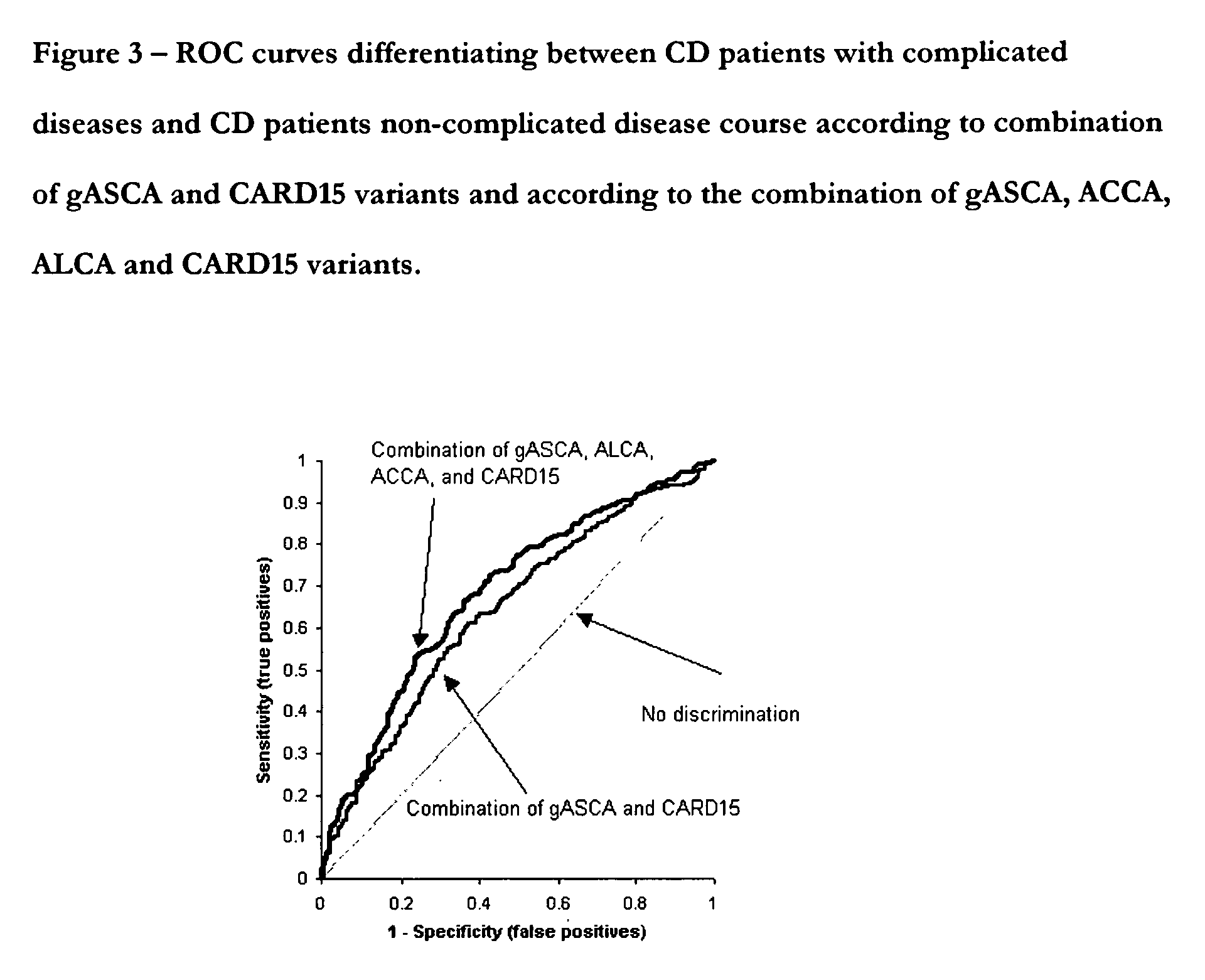Method for diagnosing and prognosing Inflammatory Bowel Disease and Crohn's disease
a technology for inflammatory bowel disease and prognosis, applied in the field of inflammatory bowel disease and crohn's disease diagnosis and prognosis, can solve the problems of reducing affecting the diagnostic accuracy of ibd and ibs, so as to facilitate earlier and more appropriate therapeutic intervention, shorten the period time, and reduce the amount of tim
- Summary
- Abstract
- Description
- Claims
- Application Information
AI Technical Summary
Benefits of technology
Problems solved by technology
Method used
Image
Examples
example 1
Comparative Antiglycan Antibody Levels in the Serum of Crohn's Disease Patients and Patients with Other Digestive Diseases
[0137] An anti-glycan antibody profile for IgG, IgA and IgM in the serum of the patients was obtained using GlycoChip® arrays (Glycominds, Ltd., Lod, Israel, Cat No. 9100). The arrays were constructed using procedures described in Schwarz et.al. Glycobiology, 13: 749-54, 2003. Anti-glycan antibody profiles of 45 CD patients and 27 patients with other digestive diseases were compared.
[0138] All serum samples were tested using GlycoChip® plates (Glycominds Ltd., Lod, Israel, Cat No. 9100), which was an array of mono and oligosaccharides covalently attached to a reduced volume 384-well micro titer plate. The mono and oligosaccharides displayed on the array are listed in Table 1. A translation of the LinearCode™ syntax used to describe glycan structure to IUPAC nomenclature can be found in Table 1.
[0139] The sera from patients volunteers who had signed an informed...
example 2
Comparative Antiglycan Antibody Levels in the Serum of Crohn's Disease (CD) Colitis Patients and Ulcerative Colitis (UC) Patients
[0146] An anti-glycan antibody profile for IgG and IgA in the serum of the patients was obtained using GlycoChip® arrays (Glycominds, Ltd., Lod, Israel, Cat No. 9100). The arrays were constructed using procedures described in Schwarz et. al., Glycobiology 13: 749-54, 2003. Anti-glycan antibody profiles of 6 CD colitis patients and 19 UC patients were compared. All serum samples were collected and tested as described in Example 1.
[0147] Tables 7 and 8 show the levels of IgG and IgA type antiglycan antibodies that were detected at significantly different levels between the CD Colitis population and the UC population. The values presented for IgG and IgA are absolute values. Comparison of the average and median values of anti-carbohydrate antibodies in the CD Colitis patients and UC patients populations reveals a significant elevation in most of the anti gl...
example 3
A Panel of Serological Antibodies (gASCA, ACCA, ALCA and AMCA) and CARD15 Gene Variations Predict a Complicated Disease Course and Need for Surgery in Some Crohn's Disease Patients
[0148] A panel of anti glycan antibodies and CARD15 gene variants were examined to determine if they could improve predictions of a complicated disease course (penetrating, fistulizing or structuring, fibrostenosing disease course, or the need for surgery) in patients with Crohn's disease. Differentiation between patients with complicated disease outcomes and patients with non complicated disease outcomes (i.e., inflammatory type) facilitates selection of the must suitable treatment at an early stage of the disease.
[0149] Frozen samples from a total of 913 CD patients (mean age 42.3 years, 58% female) were retrospectively analyzed. Clinical characteristics for complications (strictures or fistulas) and the need for surgery were obtained. The samples were tested for gASCA, ACCA, ALCA, and AMCA by commerci...
PUM
 Login to View More
Login to View More Abstract
Description
Claims
Application Information
 Login to View More
Login to View More - R&D
- Intellectual Property
- Life Sciences
- Materials
- Tech Scout
- Unparalleled Data Quality
- Higher Quality Content
- 60% Fewer Hallucinations
Browse by: Latest US Patents, China's latest patents, Technical Efficacy Thesaurus, Application Domain, Technology Topic, Popular Technical Reports.
© 2025 PatSnap. All rights reserved.Legal|Privacy policy|Modern Slavery Act Transparency Statement|Sitemap|About US| Contact US: help@patsnap.com



